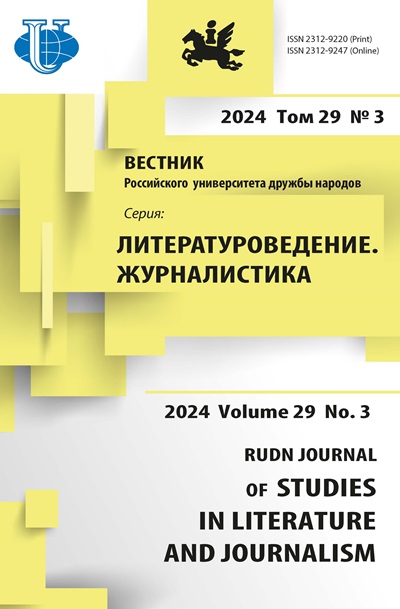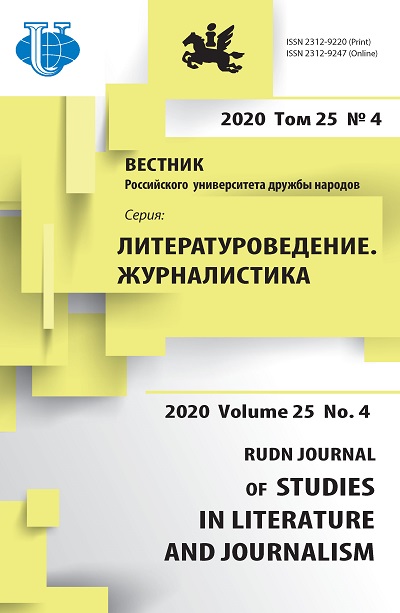The concept of “neo” and the novels of G. Rodenbach: between romanticism and symbolism
- Authors: Litvinenko N.A.1
-
Affiliations:
- Moscow State Region University
- Issue: Vol 25, No 4 (2020)
- Pages: 682-691
- Section: LITERARY CRITICISM
- URL: https://journals.rudn.ru/literary-criticism/article/view/25453
- DOI: https://doi.org/10.22363/2312-9220-2020-25-4-682-691
Cite item
Full Text
Abstract
Various forms of transition in literature and art of the turn of 19th and 20th centuries haven’t been explored enough. The use of the concept of “neo” allows to clarify the ideas of neo-romanticism that have developed in modern science. The article analyzes the novel heritage of the Belgian writer Rodenbach as a transitional phenomenon that brings together the writer's tetralogy with romanticism, Parnassus and symbolist French poetry; as well as phenomenon that organically includes Belgian literature in the European space of intertextuality. It is proved that addressing the problems of art, the artist-creator, the “beautiful soul”, connects Rodenbach with the traditions of Yen’s romanticism, at a new stage of development of literature generates a transformation of the myth of romanticism. The ideal of art is not subject to devaluation, but the artist, who lives in society, always fails. Indulging in earthly passion, coming into conflict with society and himself, he doesn’t keep faith in his beliefs. Real life creates illusions and self-deception, leading the character to disaster. Rodenbach uses a romantic model of mythologization, saturating it with symbolic allusions and signs, on the eve of modernism creates a neo-romantic novel synthesis.
About the authors
Ninel A. Litvinenko
Moscow State Region University
Author for correspondence.
Email: ninellit@list.ru
Doctor of Philological Sciences, Professor of the Department of Foreign Literatures of the Faculty of Philology
24 Very Voloshinoi St, Mytischi, 141014, Russian FederationReferences
- Coudurier, P. (2012). Le «néo» dans les cultures européennes: sources, héritages et réécritures dans la littérature. CRINI (Centre de Recherche sur les Identités Nationales et l'Interculturalité. Nantes, Université de Nantes. Retrieved September 20, 2020, from https://www.fabula.org/../le-neo-dans-les-cultures-europeennes-sources-heritages-et-reecritures-dans-la-litterature_54068.php
- Kosikov, G.K. (1993). Dva puti franczuzskogo postromantizma: Simvolisty i Lotreamon [Two paths of French post-romanticism: the Symbolists and Lautréamont]. Poeziya franczuzskogo simvolizma. Lotreamon. Pesni Mal’dorora [Poetry of French Symbolism. Lautreamont. Songs of Maldoror] (pp. 5–62). Moscow.
- Tolmachyov, V.M. (2004). O graniczax simvolizma [On the boundaries of symbolism]. Vestnik Pravoslavnogo Svyato-Tixonovskogo gumanitarnogo universiteta. Filologiya. Filosofiya. Istoriya [Bulletin of the Orthodox Saint Tikhon's Humanitarian University. Philology. Philosophy. History], (3), 247–267.
- Litvinenko, N.A. (2017). Romany Rodenbaxa: Osobennosti poetiki [Rodenbach's novels: Features of poetics]. Voprosy filologii [Philology issues], 2(58), 64–71.
- Goffin, J. (2017). Le secret de Bruges-la-Morte (pp. 41–49). Retrieved September 1, 2020, from http://bruges-la-morte.net/wp-ontent/uploads/Le-secret-de-Bruges-la-Morte.pdf
- Rodenbach, G. (2007). Les essais critiques d'un journaliste. In P. Gorceix & J. de Decker, Textes de littérature moderne et contemporaine (no. 93). Paris, Honoré Champion. Retrieved July 15, 2020, from https://www.lachouettelibrairie.com/livre/631144-les-essais-critiques-d-un-journaliste-georges-rodenbach-honore-champion
- Kristof, Sh. (2018). Konecz veka [The End of the century]. Novoe literaturnoe obozrenie [New literary review], (1), 9–23.
- Goffin J. (2017). Annexe 1: Le Carillonneur en écho à Bruges-la-Morte? Extrait du Secret de Bruges-la-Morte sur le site. Retrieved August 10, 2020, from http://bruges-la-morte.net/wp-content/uploads/Analyse-du-Carillonneur-de-Rodenbach.pdf
- Sinilo, G. (2018). Funkcii pastoralnoj i idillicheskoj topiki v nemeczkoj poezii rubezha XIX–XX vekov (Fridrix Niczshe, Stefan George) [Functions of pastoral and idyllic topics in German poetry of the XIX–XX centuries (Friedrich Nietzsche, Stefan Gheorghe)]. Pastoral: Begstvo ot dejstvitelnosti ili priblizhenie k nej? [Pastoral: Flight from reality or approximation to it?]: Collection of scientific papers (pp. 53–85). Мoscow, RGU imeni A.N. Kosygina Publ.
















